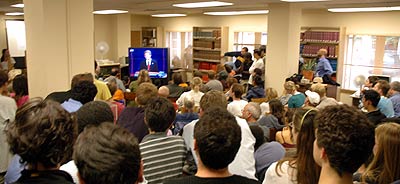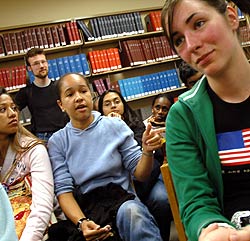UC Berkeley Web Feature
 |
Students and other Berkeley community members crowd into the IGS library in Moses Hall. (BAP photos) |
Berkeley audience declares Kerry the winner of first debate
BERKELEY – Who would be proclaimed the victor once President George W. Bush and Senator John F. Kerry left the stage of their first televised debate? Ruefully acknowledging that they wore Berkeley-colored glasses, most members of a crowd who watched the match on campus together agreed that Kerry not only won the debate, but whacked a political home run.
| Berkeley Republicans stand by their prez A very different hundred students — members of the Berkeley College Republicans — watched the debate as well. Read about their take in this Journalism School story |
More than a hundred people crowded into the Institute of Governmental Studies' library. Students stood on piles of textbooks and chairs, and even leaned in from the windows and hallway outside to listen to the big-screen TV set up for the occasion, while faculty, staff, and community members squeezed in where they could.
If there were any Bush supporters in the audience, they remained undercover. Several of Kerry's statements inspired whoops and cheers - the loudest after he said, "It's one thing to be certain, but you can be certain and be wrong" - while Bush's performance elicited laughter, groans and a few hisses. But for the most part, the audience was respectful, shushing each other in order to listen closely to every word.
After the debate, about half the audience stayed for an informal discussion. Jerry Lubenow, program director of the Center on Politics, which hosted the screening, asked for a show of hands to indicate which candidate had won the debate. Kerry was the universally acknowledged victor; Bush received no hands. However, in response to Lubenow's follow-up question "How many of you think the media will call the debate for Kerry?" only about a third raised their hands. A subsequent third thought the media would declare Bush the winner, while another third thought the debate would be declared a draw.
Matt Haney, a political science major and Informal Debate Society co-president, then threw out a question to the floor. "The papers said Kerry needed to hit a home run in this debate to close the gap in the polls. Did he succeed?"
 About half the audience stayed for an informal discussion following the debate. |
Here, the consensus seemed to be yes - "He distilled all the answers and didn't get long-winded. I really think he hit it out of the park!" However, students (and a few non-student audience members) kept adding the caveat that they could not offer unbiased opinions and might be influenced by the Berkeley reality-distortion field. Several emphasized that what mattered was the reaction of voters in the swing states, and how partisan media, particularly Fox News, would spin the debate the next day.
"It's too early to tell who won," said one student. "I think we're being too optimistic. Bush kept saying over and over that 'sending mixed messages,' his code for flip-flopping, means danger, and maybe that's what will stick."
The students were extremely critical of Bush's performance. "He seemed disheveled and rambling," said one. "His sentences trailed off and he had this deer-in-the-headlights look." Another observed that debates take place on two levels: the emotional and the intellectual. "Bush often operates very successfully on the emotional level, using preacher's cadences. He seemed a lot less able to do that this time," he said.
Two students were brave enough to offer dissent. One, who gingerly identified herself as an undecided voter, said that as a business major, she thought Bush had done a better job of marketing himself in the debate. "Bush knows his audience and how to talk to them. When you're buying a product, you buy a brand because you've had it before and you know it will work for you. Bush reinforced his brand quite well." Perhaps emboldened, another woman said quietly, "I think Kerry lost this debate. It doesn't matter if you're smarter, but whether you're more likeable. And I liked Bush more by the end of this debate. That's what I'll remember."
Kerry's performance was not without its flaws, which many were quick to point out. An international student said that he found Kerry's goal of bringing more allies into Iraq ridiculous and futile. Another said that he thought Kerry's plan for Iraq made no sense, to which his neighbor replied, "It's easy to criticize Kerry there. But does anybody here have a plan to fix Iraq?" — greeted with much rueful laughter. A young man standing in the back said angrily that Kerry should have forced moderator Jim Lehrer to give him time to rebut Bush's statement about refusing to join the International Criminal Court system (intended to prosecute international war crimes). "Kerry could have knocked that right back at him with two words: Abu Ghraib," argued the student.
"Yes, it's amazing they could spend 90 minutes talking and not once mention Abu Ghraib or really discuss the Israel-Palestine situation," commented a faculty member.
Haney brought the discussion to a close around 8:30 and directed the students to a reception next door provided by the Undergraduate Political Science Association.
"I'm just so glad I came, because I would have been so angry at home and had no one to talk to," said Rene Schneeberger, a third-year political science major who just arrived from Switzerland. "I watched Bush's acceptance speech at the Republican Convention and thought it was so lousy. Then the next day, all the pundits said it was great! I was so frustrated! At least this way I know that a lot of other people thought the same things I did about the debate, no matter what they say in the paper tomorrow."
The Center on Politics will screen the live broadcast of the vice-presidential debate on Tuesday, Oct. 5; the second presidential debate on Friday, Oct. 8; and the final presidential debate on Wednesday, Oct. 13 in 109 Moses Hall. All the debates begin at 6 p.m. and will be followed by a faculty discussion. Arrive early to ensure a seat.

